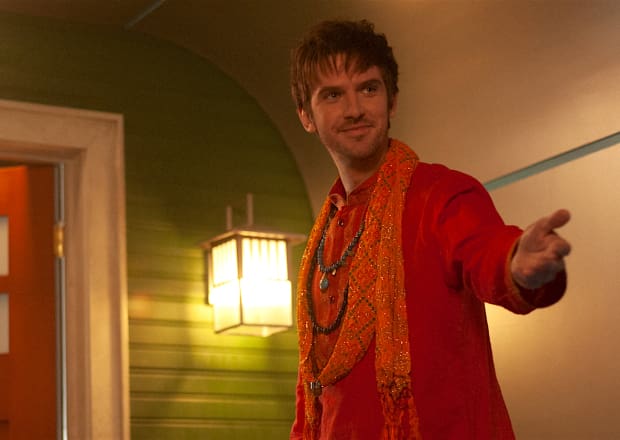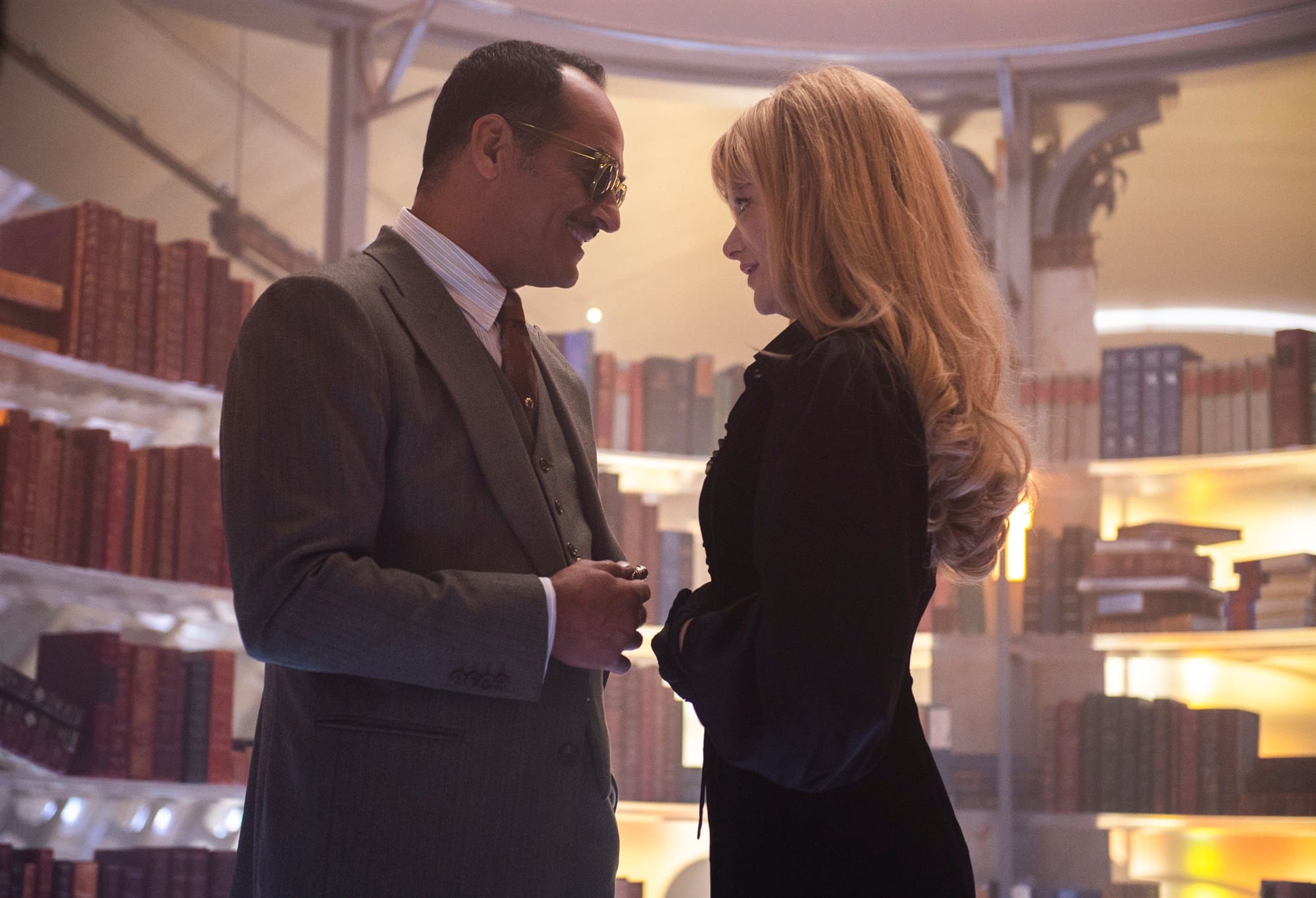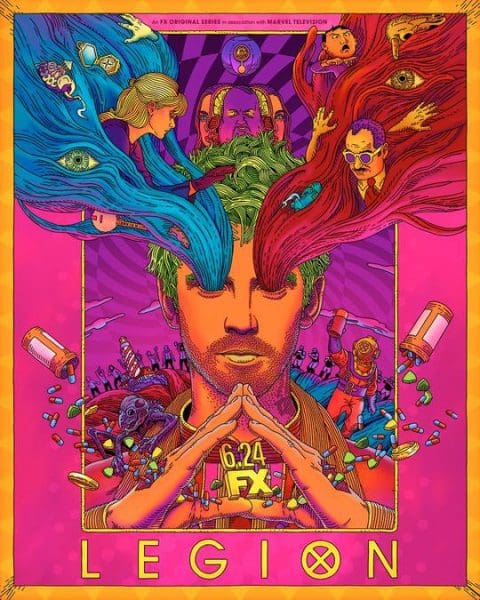
Welcome to the third and final season of Legion. What is easily the most ambitious television adaptation of a comic book series to date, the show has been a real treasure to watch these last few years, and the end of the series is likely to go places it hasn’t gone before. Which is saying a lot, because this show has just about gone everywhere you can think of.
Let’s start by recapping where Season 2 left off. David (Dan Stevens) has spent the entirety of the season assuming he was not mentally ill, like Melanie (Jean Smart) told him in season one. But she was wrong: David is mentally ill as well as a powerful mutant, and the lack of attention he or anyone around him paid to this fact has come close to turning him into a monster. Rather than face that fact and admit he needs help, he fled Division Three with Lenny (Aubrey Plaza) to parts unknown. All that IS known is that he ends the world at an undetermined point in the future, which means the Summerland gang needs to find him and kill him before it happens.
For the first half of episode one we don’t really see any of that conflict, however. Instead we get to know this season’s new character, Switch (Lauren Tsai) a young girl living in a modern-looking city. Switch stands out instantly because of her loud sense of style, and her choice of vibrant colors. She gets perfect grades and does well in school, but she has an empty home life as her father is more interested in robots than he is in her, and her isolated nature leads her to start noticing cryptic posters all around the city looking for a time traveler. This catches her eye because Switch is, in fact, a time traveler. After being instructed to “find the orange fish” or “follow the yellow bus,” Switch finds what she’s been looking for: a cult, started by David (Haller) and Lenny (Plaza).
What’s interesting about Switch is that despite clearly being a lonely and unfulfilled girl, she has a lot of vibrancy in the earlier part of the episode. When we meet her, she’s wearing a bright yellow jacket and stands out on the crowded city streets. When she finds David’s cult, her clothes are transformed into more muted earth tones, and the patterns into more floral 60’s and 70’s attire, like what is often seen on the show, specifically by those closest to David’s orbit. What is so striking about this miniature transformation is that Switch had been somewhat anachronistic with her much more modern style. But as soon as she joins David, she’s quite literally stuck in the past as she continually tries to go back in time and help him un-do the scenarios that keep leading to his death. <
By mid-way through the episode, we know that Division Three has been looking to find and eliminate David and prevent the end of the world. All of them are in on this – even Syd (Rachel Keller), who seems to have a bit of a chip on her shoulder about the events at the end of season two and wants to personally deliver the shot that kills David. And she does, twice. But both times Switch is there to go back in time and try and change the course of events so that David is spared. While she’s in the process of going back in time, Farouk intercepts her in the astral plane and asks her what it is David can give her that she’s so determined to help him. Her answer is a little unclear at the moment: he is a man, and Farouk is a robot. She’s able to flee the astral plane right under Farouk’s nose, a move that visibly aggravates him.
But there’s a lot to unpack in Farouk and Switch’s meeting. Farouk wants to know what Switch needs from David, but what does Farouk need from him? Why is a man who views himself as a god, who is over two thousand years old, joining forces with Division Three and allowing himself to mingle with them as though he’s another soldier doing his job? Something about Farouk’s willingness to play nice for the sake of finding David doesn’t sit right with me, and I think there’s a lot more to David calling him a parasite than they originally let on.
I think Farouk needs to use David – or any powerful mutant – as an amplifier for his own powers, and without having someone powerful around him, he’s weak enough to be bested by a teenager like he was by Switch. It’s an interesting dynamic because you know that whatever has aligned Farouk with Division Three is temporary, and I can’t see him staying on their side the entire season. Just because David turned out to be the villain doesn’t automatically mean that Farouk is the hero.
And David absolutely turned out to be the villain. There was clearly a time jump between seasons two and three, and in that time David has amassed an entire cult around him and Lenny, most made of women who are loyal to David and provide him the unconditional love he craves. They are also almost always high on a drug that it seems David synthesizes himself. David’s got major illusions of grandeur and has been seeking a time traveler for unknown reasons.

He denies that it’s to go back in time and undo the mistakes he made with Syd, although he clearly wants to undo something if he needs a time traveler. He gives Switch a speech about his life and the demon that haunted him and drove him insane, at no point taking responsibility for any of his actions. Switch doesn’t seem entirely swayed, but she must be, because the moment Division Three swoops in and kills David, she runs backwards in time to warn him.
He seems skeptical at first, but when he takes her back to the cult house and sees Division Three’s soldiers engaged in combat with the woman of his cult – who, interestingly, are largely holding their own in a fight – he is incensed. This scene is an exact parallel of the scene from the very first episode of the series when David is being escorted through a warzone by Syd, who navigates it with ease while it seems like the world is burning behind them. “Stick with me” is all you need to say in a situation like that to get someone to want to follow you to the ends of the earth, it seems. Switch is fully Team David after she watches him get shot, again, and runs backwards in time to save him.
Oh, and Cary (Bill Irwin) put the consciousness of Ptonomy (Jeremie Harris) into a mainframe and then put that mainframe into a robot that looks like Ptonomy, so now Ptonomy is a robot. He seems to take on the role Admiral Fukiyama had last season, where he is seen leading the Vermillion androids, who take his direction. Ptonomy is the most severely underused character on the series, and I’m a little sad to see him be even more subdued as a robot than he was as a human, but I’m interested in seeing where this goes. Especially given Switch’s established aversion to robots.
At the end of the episode, we unfortunately don’t know much more than we could have gathered from watching the promos and trailers. We know David starts a cult and wants a time traveler to prevent his death, and that his former friends want him dead. With only seven episodes left to go, it feels slightly wasteful not to give us more in the season premiere, but I can only hope that the next few episodes pack way more action and story in. While the trippy visuals and strange, impromptu musical numbers have been a hallmark of the series and are a joy to see, I’d like to see the action on screen match the urgency that I, as a viewer, have to watch the end of one of my favorite television series unfold. Though not very shocking or eventful, it was a classic episode of Legion, and I am dutifully tuning in every week until it’s over.
Overall: 8 out of 10



Comments are closed.